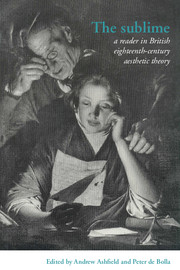Book contents
- Frontmatter
- Contents
- List of Abbreviations
- Introduction
- Part I The Longinian tradition
- Part II Rhapsody to rhetoric
- 11 The spectator, (1712-1714)
- 12 A discourse on ancient and modern learning (1734)
- 13 Characteristicks (1714)
- 14 The works (1724)
- 15 To David Fordyce, 18th June 1742
- 16 The pleasures of imagination (1744)
- 17 An essay on the sublime (1747)
- 18 Observations on man (1749)
- 19 Lectures on the sacred poetry of the Hebrews (1753/1787)
- 20 A dictionary of the English language (1755)
- 21 Conjectures on original composition (1759)
- 22 The art of speaking (1761)
- 23 A course of lectures on oratory and criticism (1777)
- 24 An enquiry concerning the principles of taste (1785)
- Part III Irish Perspectives
- Part IV The Aberdonian Enlightenment
- Part V Edinburgh and Glasgow
- Part VI From the Picturesque to the Political
- Sources and further reading
11 - The spectator, (1712-1714)
Published online by Cambridge University Press: 05 June 2012
- Frontmatter
- Contents
- List of Abbreviations
- Introduction
- Part I The Longinian tradition
- Part II Rhapsody to rhetoric
- 11 The spectator, (1712-1714)
- 12 A discourse on ancient and modern learning (1734)
- 13 Characteristicks (1714)
- 14 The works (1724)
- 15 To David Fordyce, 18th June 1742
- 16 The pleasures of imagination (1744)
- 17 An essay on the sublime (1747)
- 18 Observations on man (1749)
- 19 Lectures on the sacred poetry of the Hebrews (1753/1787)
- 20 A dictionary of the English language (1755)
- 21 Conjectures on original composition (1759)
- 22 The art of speaking (1761)
- 23 A course of lectures on oratory and criticism (1777)
- 24 An enquiry concerning the principles of taste (1785)
- Part III Irish Perspectives
- Part IV The Aberdonian Enlightenment
- Part V Edinburgh and Glasgow
- Part VI From the Picturesque to the Political
- Sources and further reading
Summary
The Spectator No. 412 Monday, June 23, 1712
… Divisum sic breve fiet Opus.
Martial.I shall first consider those pleasures of the imagination, which arise from the actual view and survey of outward objects: and these, I think, all proceed from the sight of what is great, uncommon, or beautiful. There may, indeed, be something so terrible or offensive, that the horror or loathsomeness of an object may overbear the pleasure which results from its greatness, novelty, or beauty; but still there will be such a mixture of delight in the very disgust it gives us, as any of these three qualifications are most conspicuous and prevailing.
By greatness, I do not only mean the bulk of any single object, but the largeness of a whole view, considered as one entire piece. Such are the prospects of an open champian country, a vast uncultivated desert, of huge heaps of mountains, high rocks and precipices, or a wide expanse of waters, where we are not struck with the novelty or beauty of the sight, but with that rude kind of magnificence which appears in many of these stupendous works of nature. Our imagination loves to be filled with an object, or to grasp at any thing that is too big for its capacity. We are flung into a pleasing astonishment at such unbounded views, and feel a delightful stillness and amazement in the soul at the apprehension of them.
- Type
- Chapter
- Information
- The SublimeA Reader in British Eighteenth-Century Aesthetic Theory, pp. 62 - 69Publisher: Cambridge University PressPrint publication year: 1996
- 2
- Cited by

